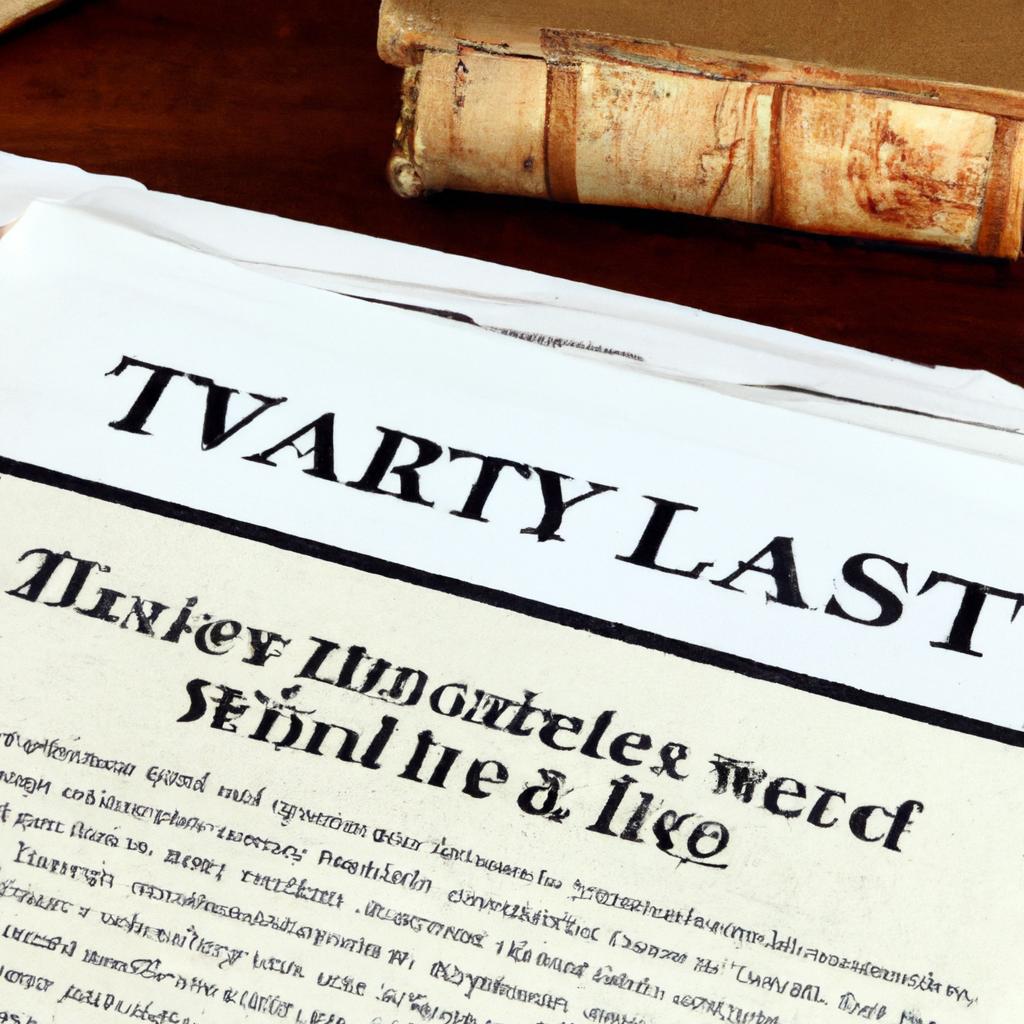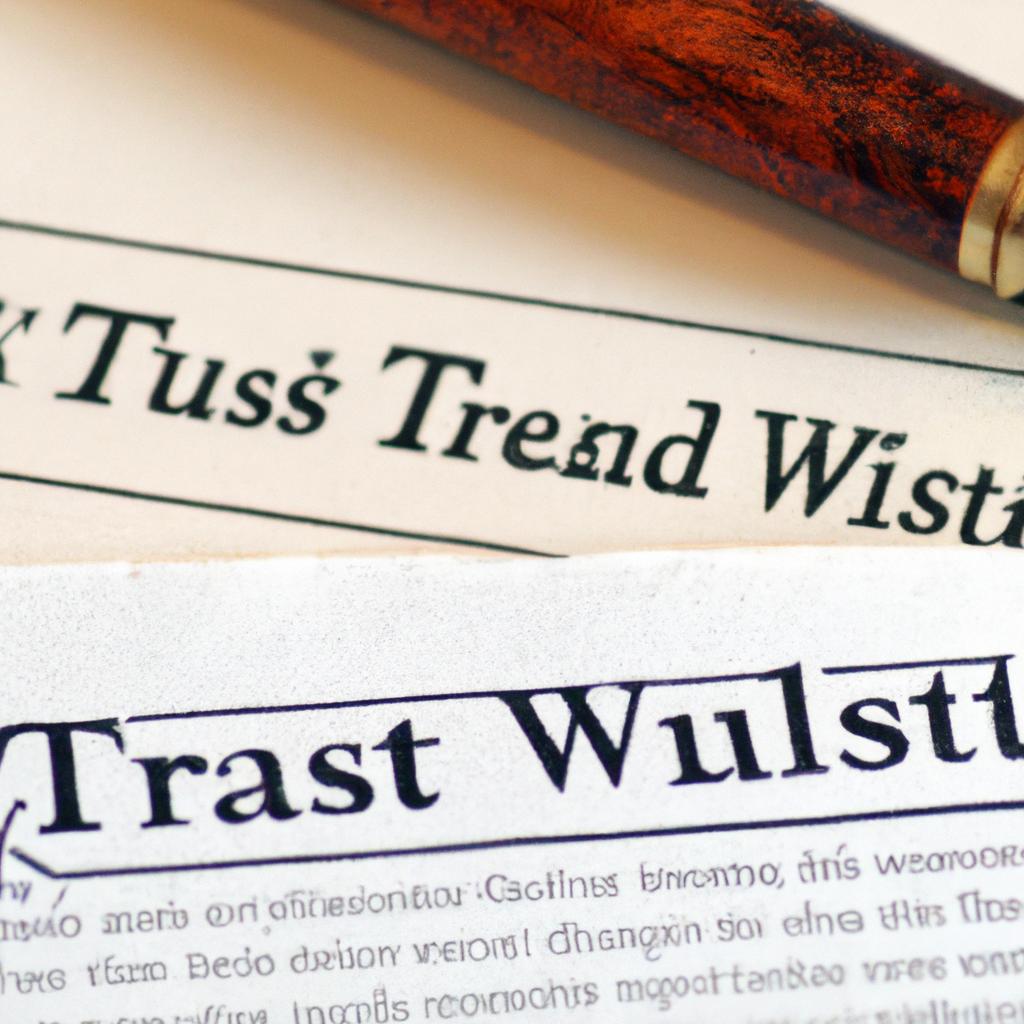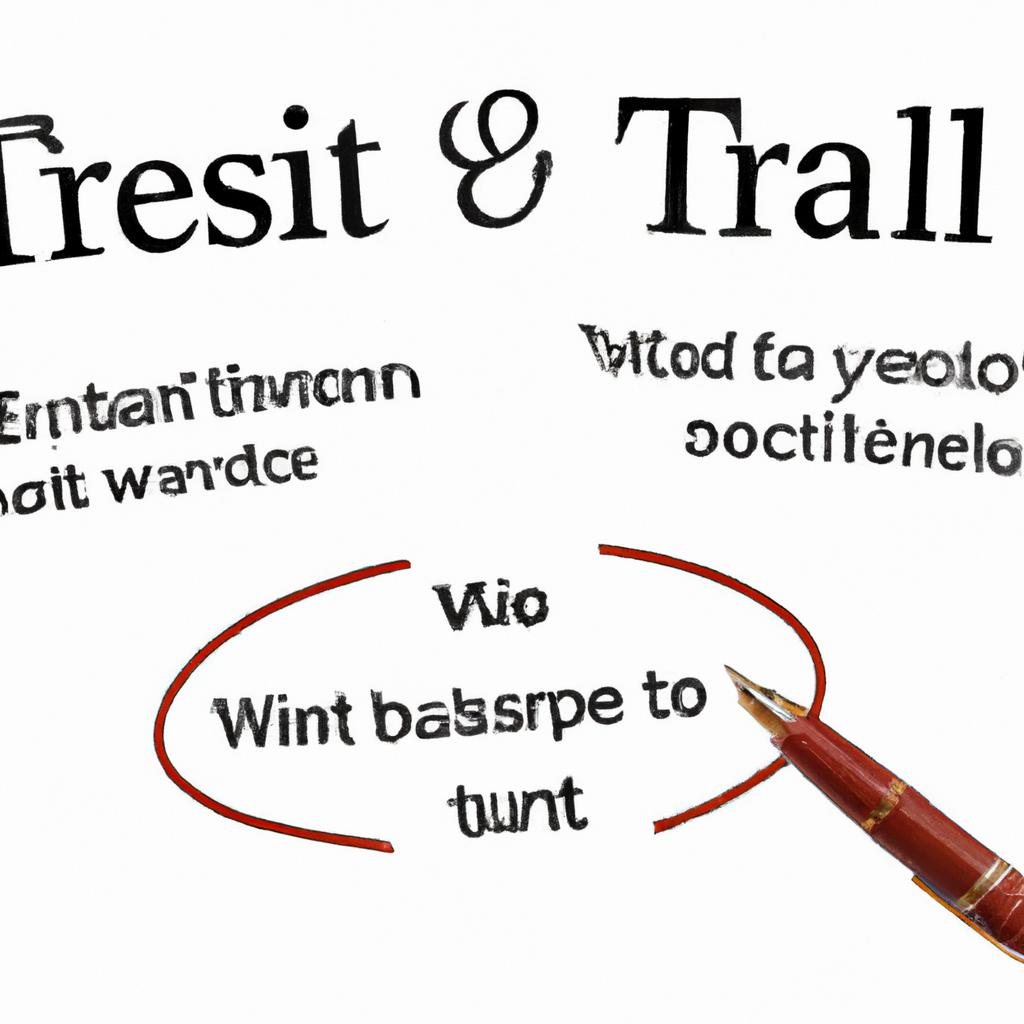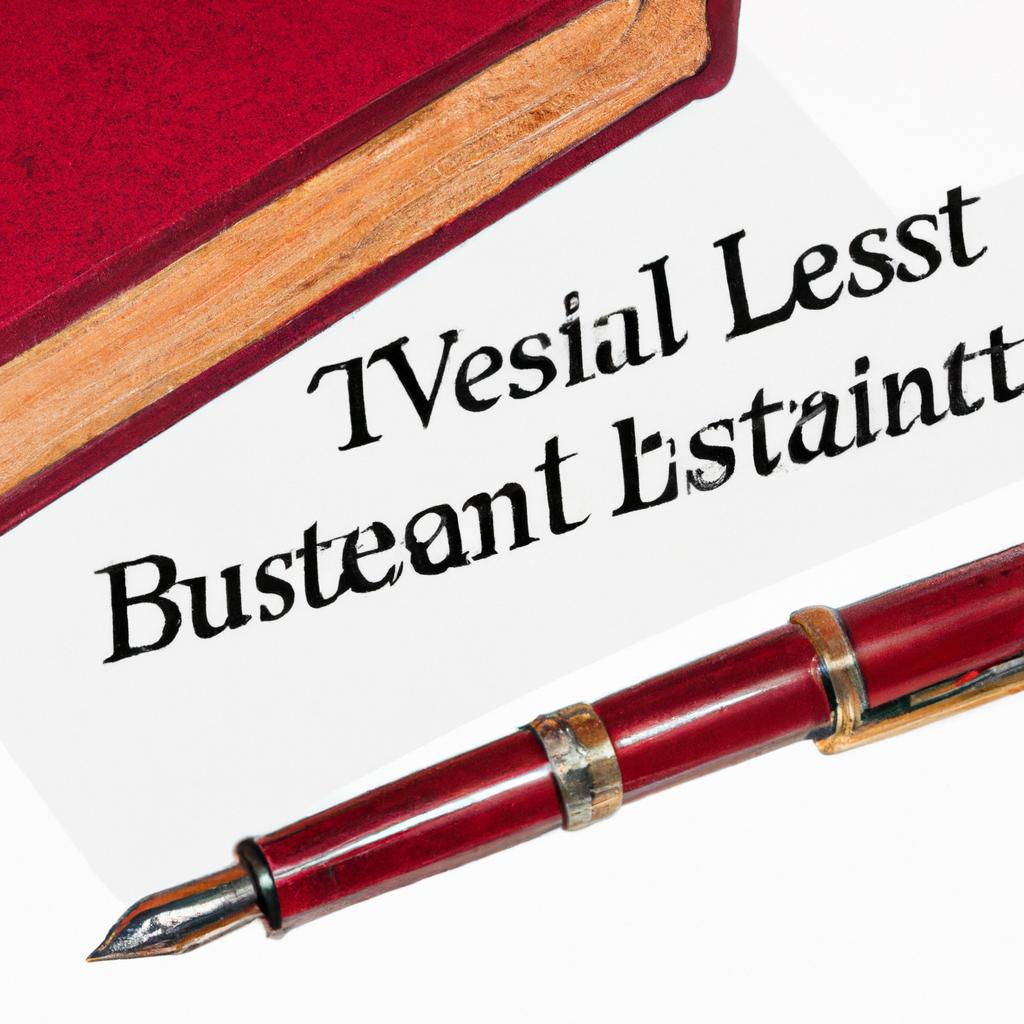In the intricate tapestry of estate planning, there lies a crucial piece of the puzzle that often goes overlooked – the creation of a last will and trust. As seasoned practitioners in the field of law, we at Morgan Legal Group understand the weight and importance of ensuring your assets are protected and distributed according to your wishes. Join us as we unravel the complexities of last wills and trusts, shedding light on the pivotal role they play in securing your legacy for generations to come.
Understanding the Importance of Last Will and Trust Documents
When it comes to estate planning, last will and trust documents are crucial components that should not be overlooked. These legal instruments play a key role in ensuring that your wishes are carried out after you pass away, as well as in protecting your assets and providing for your loved ones. By clearly outlining how you want your estate to be distributed, you can avoid potential disputes among family members and ensure that your legacy is preserved.
Having a carefully drafted last will and trust can also help minimize estate taxes and avoid the lengthy and costly probate process. Trusts, in particular, can offer additional benefits such as asset protection, privacy, and flexibility in how your estate is managed and distributed. Consulting with an experienced estate planning attorney like the experts at Morgan Legal Group in New York City can help you navigate the complexities of creating these important documents and ensure that your final wishes are carried out according to your intentions.

Key Differences Between a Will and a Trust in Estate Planning
When it comes to estate planning, understanding the key differences between a last will and a trust is crucial for ensuring your assets are distributed according to your wishes. One of the main distinctions between the two is how they come into effect. A last will only goes into effect after your death, while a trust can be active during your lifetime and after your passing.
Another important difference is privacy. A last will becomes a public record once it goes through probate, whereas a trust allows for a more private transfer of assets to beneficiaries. Additionally, trusts can provide more flexibility in how assets are managed and distributed, offering greater control over the process. It’s essential to consult with an experienced estate planning attorney, like the professionals at Morgan Legal Group in New York City, to determine which option best suits your individual needs and goals.

Factors to Consider When Choosing Between a Will and Trust
When deciding between a last will and a trust, there are several important factors to consider. One key consideration is the level of privacy you desire. A will becomes a matter of public record during the probate process, whereas a trust allows for a more private distribution of assets without court intervention. Additionally, the flexibility of a trust may be more suited to your needs if you have complex or changing circumstances. Trusts can be designed to address specific wishes and provide ongoing management of assets.
Another factor to consider is the potential for avoiding probate. Assets held in a trust typically avoid probate, which can save time and money for your beneficiaries. Additionally, trusts can provide protection against challenges to your estate plan. By establishing clear guidelines and distribution instructions in a trust, you can help minimize the likelihood of disputes among your loved ones. Ultimately, the decision between a will and trust should be based on your individual goals and needs, and consulting with an experienced estate planning attorney can help ensure that your wishes are carried out effectively.

Ensuring Your Assets Are Properly Distributed Through a Last Will and Trust
When it comes to , there are several important factors to consider. A last will and trust are legal documents that outline how you want your assets to be distributed upon your passing. By creating a last will and trust, you can ensure that your wishes are carried out and that your loved ones are taken care of.
- Consult with an experienced estate planning attorney to help you draft a last will and trust that accurately reflects your wishes.
- Consider the tax implications of your assets and how they will be distributed.
- Choose a reliable executor and trustee to oversee the distribution of your assets.
| Assets | Distribution |
|---|---|
| Real Estate | To be evenly divided among children |
| Investments | To be managed by a financial advisor for the benefit of grandchildren |
By taking the time to properly plan and document your wishes through a last will and trust, you can ensure that your assets are distributed according to your wishes and provide peace of mind for your loved ones. Contact our team at Morgan Legal Group in New York City for expert guidance on estate planning, probate, elder law, and creating Wills and trusts.
Q&A
Q: What are the key differences between a last will and a trust?
A: A last will is a legal document that outlines how a person’s assets and properties should be distributed after their death, whereas a trust is a legal entity that holds assets on behalf of a beneficiary.
Q: Why should someone consider creating a trust rather than just a last will?
A: Creating a trust can offer more privacy, flexibility, and control over how assets are managed and distributed, whereas a last will is subject to probate and can be contested by disgruntled parties.
Q: Can a person have both a last will and a trust?
A: Yes, a person can have both a last will and a trust in their estate plan. The last will can be used to handle any assets not included in the trust, while the trust can provide for more specific instructions and benefits.
Q: How can someone ensure that their last will and trust are legally valid?
A: It is important to consult with a qualified estate planning attorney to ensure that the last will and trust comply with state laws and reflect the individual’s wishes. Regularly reviewing and updating these documents is also recommended.
Q: What happens if someone dies without a last will or trust in place?
A: If someone dies without a last will or trust, their assets will be distributed according to state intestacy laws, which may not align with their wishes. Creating these legal documents can help avoid confusion and disputes among family members.
In Conclusion
In conclusion, planning for the future is a crucial step in ensuring that your final wishes are carried out as you intend. By creating a last will and trust, you can protect your assets, provide for your loved ones, and leave a lasting legacy. Don’t wait until it’s too late – take the time to consider your options and seek professional guidance to ensure that your wishes are carried out smoothly. Your loved ones will thank you for your foresight and careful planning. Start planning for tomorrow, today.
 Last Will and Trust: A Comprehensive Guide for Planning Your Legacy
Last Will and Trust: A Comprehensive Guide for Planning Your Legacy
In this fast-paced world, it’s easy to get caught up in the present and forget about planning for the future. But as we all know, life is unpredictable and having a plan in place for when we’re no longer around is crucial. This is where a last will and trust comes into play. These legal documents are the cornerstones of estate planning and provide a roadmap for how your assets and final wishes will be handled after your passing. In this article, we’ll delve into the details of a last will and trust, why it’s essential, and how to create one that reflects your wishes.
What is a Last Will and Trust?
A last will and trust are two distinct legal documents that work hand in hand to ensure your final wishes are carried out according to your wishes. Let’s break down each of these documents.
Last Will – A last will, or a last will and testament, is a legal document that outlines how your assets will be distributed after your death. It allows you to designate beneficiaries, appoint an executor, and provide instructions for how your final affairs should be handled.
Trust – A trust is a legally binding arrangement where a third party, known as the trustee, holds and manages the assets on behalf of the beneficiaries. The assets in the trust are then distributed according to the terms set by the person who created the trust, known as the grantor. Trusts can be either revocable or irrevocable, and they offer more control and flexibility over the distribution of assets compared to a will.
Benefits of Having a Last Will and Trust
There are several benefits to having a last will and trust in place, including:
1. Protecting Your Assets – A last will and trust can protect your assets from creditors, lawsuits, and even family disputes. By properly designating your beneficiaries and creating a trust, you can ensure your assets are safeguarded and distributed according to your wishes.
2. Avoiding Probate – Probate is the legal process of distributing a deceased person’s assets and can be time-consuming, expensive, and public. With a last will and trust, your assets can be distributed outside of probate, saving your loved ones from additional stress and expenses.
3. Ensuring Minor Children are Cared For – When minor children are involved, a last will and trust can designate a guardian or trustee to take care of their financial and personal needs. This provides peace of mind knowing your children will be taken care of by someone you trust.
4. Maintaining Privacy – Unlike a will, which becomes public record after probate, trusts are not made public. This allows for a higher level of privacy for your beneficiaries and can protect your family from unwanted attention.
Practical Tips for Creating a Last Will and Trust
Now that you understand the benefits of a last will and trust, it’s time to start creating one. Here are some practical tips to keep in mind:
1. Hire an Attorney – While it may be tempting to use online templates or DIY kits, it’s always best to seek professional guidance from an attorney. Not only will this ensure that your last will and trust are legally valid, but they can also provide personalized advice that meets your specific needs.
2. Clearly Outline Your Wishes – One of the most important aspects of a last will and trust is clearly outlining your wishes. Make sure to be specific in how you want your assets distributed and who you want to handle your affairs. Leaving any ambiguity can lead to disputes and challenges down the line.
3. Keep Your Documents Updated – Life is constantly changing, and with it, so should your last will and trust. Make it a habit to review and update your documents whenever there is a significant change in your life, such as a marriage, divorce, birth, or death of a beneficiary.
4. Choose the Right Executor and Trustee – Selecting an executor and trustee is a critical decision, as they will be responsible for carrying out your wishes. Make sure to choose someone who is trustworthy, organized, and capable of handling the responsibilities.
First-Hand Experience with a Last Will and Trust
For some, the thought of creating a last will and trust may seem overwhelming or even unnecessary. But for those who have experienced the loss of a loved one without a plan in place, the importance of these documents becomes clear. We spoke to John, who lost his father several years ago, and shares his experience:
“I never thought much about estate planning until my father’s sudden passing. He didn’t have a last will or trust, so the whole process of distributing his assets became a nightmare for my family. As the eldest son, I had to handle everything, including dealing with creditors and settling disputes between my siblings. It was a stressful and emotionally draining time for us all. Looking back, I wish my father had taken the time to create a last will and trust as it would have saved us a lot of heartache and confusion.”
In Conclusion
No one likes to think about their own mortality, but creating a last will and trust is an essential aspect of responsible financial planning. These documents not only protect your assets and loved ones but also give you the peace of mind knowing that your final wishes will be carried out. So don’t wait – speak to an attorney and create your last will and trust today.

